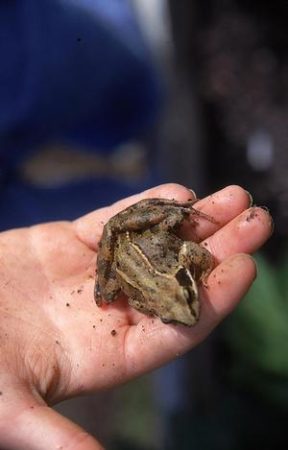Post category: Natural Equilibrium
Nature tends towards balance. If because of favourable weather, huge numbers of a pest appear, and plant defences are overwhelmed, there are two consequences. The plants under attack fail to produce as much seed, so there will be fewer plants the following year. This means less food for the pest, causing numbers to decrease.

Frogs eat slugs
At the same time, the predators and parasites would quickly increase in numbers, there being a large population of pests to feed off. In time, the two factors would bring pest numbers back to the former level.
Natural pest control could be largely relied upon if the garden had only wild plants and wild habitat. In a garden of cultivated plants, artificial plant populations are created. Plants are grown in groups or rows, inviting pest attack.
Weeds and debris are removed, destroying the shelter of predators. A garden is an artificial situation and natural balancing systems will generally not get it right, unaided. However, the natural systems go a long way towards keeping the balance right.
Correct pest control in the garden should concentrate on encouraging, or at least not damaging, the natural systems. Only if the natural control systems prove inadequate, because of the artificiality of the garden, should they be assisted by physical or chemical control methods.


